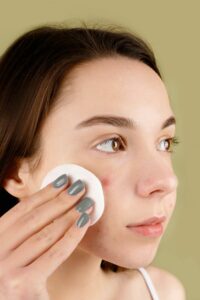How Skin Care Products Cause Acne and How to Break the Cycle
Introduction
You’ve probably wondered, “Why do skin care products cause acne?” It seems like a cruel twist of fate when the very products you use to care for your skin end up causing breakouts. But don’t worry; you’re not alone.
The truth is, many skincare products contain ingredients that can clog your pores, irritate your skin, or disrupt its natural balance, leading to acne. Understanding the link between your skincare routine and breakouts can help you avoid common pitfalls.
Let’s examine how this happens and how you can break the cycle of skincare-induced acne.
Table of Contents
Understanding the Role of Ingredients in Acne
One of the main culprits behind product-induced acne is the ingredients list. Some common skincare ingredients, like heavy oils or silicones, can be comedogenic, meaning they block your pores. When your pores are clogged, it creates the perfect environment for acne to thrive. Other ingredients, such as certain preservatives or fragrances, can irritate your skin, leading to inflammation and breakouts. It’s important to get familiar with your product’s ingredients, so you can spot the potential troublemakers before they have a chance to wreak havoc on your skin.

The Overuse of Products and Its Impact
Another factor to consider is how much product you’re using. More isn’t always better when it comes to skincare. Overloading your skin with too many products can overwhelm it, leading to irritation and—you guessed it—acne. This is especially true if you’re layering multiple products with active ingredients like retinoids, exfoliating acids, or even moisturizers. Your skin might become stressed, causing it to react with breakouts. The key here is balance. You don’t need to ditch all your products, but be mindful of how many you’re using and whether they’re all necessary.
Breaking the Acne Cycle: What You Can Do
So, how do you break this frustrating cycle of acne caused by skincare products? Start by simplifying your routine. Focus on the basics: a gentle cleanser, a suitable moisturizer, and sun protection. Gradually reintroduce other products, one at a time, so you can monitor how your skin reacts. If you notice any breakouts, it might be time to reconsider that product’s place in your routine. Additionally, look for non-comedogenic labels and products formulated for sensitive or acne-prone skin. These are less likely to trigger breakouts, helping you keep your skin clear and healthy.
Listening to Your Skin
Your skin is unique, and what works for someone else might not work for you. Pay close attention to how your skin responds to different products. If something doesn’t feel right, don’t be afraid to make changes. It’s all about finding what works best for your skin. And remember, skincare is a journey. With patience and the right approach, you can break the cycle of acne and achieve the clear, glowing skin you deserve.
Why Skin Care Products Cause Acne: Key Ingredients to Watch
Navigating the world of skincare can be tricky, especially when some popular ingredients might be the very reason behind your breakouts. If you’ve ever wondered why skin care products cause acne, it’s crucial to understand which ingredients might be causing issues. In this section, we’ll explore some common acne-triggering ingredients and provide a list of specific ones to watch out for.

Heavy Oils: The Pore-Clogging Problem
Heavy oils are often celebrated for their moisturizing benefits, but they can also clog pores, particularly for those with oily or acne-prone skin. Ingredients like coconut oil, palm oil, and some types of mineral oil are known to be comedogenic, meaning they have a high likelihood of causing breakouts. If you’re prone to acne, it’s wise to choose products with lighter oils, such as jojoba or argan oil, which are less likely to block your pores.
Silicones: Smooth Finish, Rough Outcome
Silicones are commonly used in primers and foundations to create a smooth, even texture. While they give a flawless finish, they can also trap oil, dirt, and bacteria on your skin, leading to clogged pores and acne. Key silicone ingredients to look out for include:
- Dimethicone
- Cyclopentasiloxane
- Cyclohexasiloxane
- Trimethylsiloxysilicate
If you find that your skin breaks out after using silicone-based products, consider switching to alternatives without these ingredients.
Fragrances: Smells Good, But Is It Worth It?
Fragrances, whether natural or synthetic, can be irritating to the skin and might cause inflammation, which can lead to acne. If you’ve noticed that your skin breaks out after using scented products, opt for fragrance-free options. Ingredients to avoid include:
- Parfum (Fragrance)
- Essential Oils (if your skin is sensitive)
Switching to products without added fragrances can help reduce irritation and prevent breakouts.
Alcohol: Drying Out Your Skin and Your Patience
Alcohol is often used in toners and astringents to give a non-greasy feel. However, it can dry out your skin, causing it to produce more oil and leading to clogged pores. Common alcohol-based ingredients to watch out for are:
- Ethanol
- Isopropyl Alcohol
- Denatured Alcohol
- Alcohol Denat
If you find your skin becoming excessively dry or irritated, consider using alcohol-free products that are gentler on your skin.
Hydration vs. Breakouts: Balancing Moisture to Prevent Acne from Skin Care Products
Finding the right balance between hydration and preventing breakouts can feel like walking a tightrope. Again you might still be wondering, “Why do skin care products cause acne?” Often, it’s because the products you use are disrupting this delicate balance. Hydration is essential for healthy skin, but overdoing it or using the wrong products can lead to acne.

Finding the Right Moisturizer for Your Skin Type
Choosing the right moisturizer is key to balancing hydration and preventing acne. Look for products labeled “non-comedogenic,” which are less likely to clog pores. For oily or acne-prone skin, gel-based moisturizers or those containing hyaluronic acid are often ideal. They provide hydration without the extra oil. For example, the Morning Dew Serum, which includes sodium hyaluronate, offers hydration without overwhelming your skin. If you have dry skin, seek out products with ceramides or phytoceramides, but avoid heavy oils like those found in some moisturizers.
Tips for Maintaining the Perfect Hydration-Prevention Balance
Maintaining the right balance between hydration and acne prevention requires some experimentation. Here are a few tips to help you:
- Patch Test New Products: Before applying a new product to your entire face, do a patch test to ensure it doesn’t cause breakouts.
- Monitor Your Skin’s Reaction: Pay attention to how your skin reacts to different products and make adjustments as needed.
- Hydrate from Within: Drinking plenty of water can support your skin’s hydration from the inside out, reducing the need for heavy topical moisturizers.
When to Change Your Skin Care Products to Avoid Acne
The reality is, your skin’s needs can change over time, and what once worked flawlessly may now be contributing to acne. Recognizing when to switch your skincare products is key to maintaining clear, healthy skin

How Long Should You Give a Product Before Switching?
When introducing new skincare products, patience is essential. Generally, you should give a product four to six weeks to show its effects. This allows your skin enough time to adjust and for any benefits or potential issues to become evident. However, if you notice immediate irritation or a sudden increase in breakouts, it might be best to stop using the product sooner. Trust your skin’s response, and don’t be afraid to make adjustments if necessary.
How to Safely Transition to New Skin Care Products
Once you’ve decided it’s time to update your skincare routine, it’s crucial to do so gradually. Switching all your products at once can overwhelm your skin, potentially leading to more breakouts. Instead, introduce one new product at a time. If you suspect that your current serum is contributing to acne, consider trying a product designed to address these concerns. Sanaa Beauty Beam Serum, for instance, is formulated with skin-soothing ingredients like bakuchiol and licorice root extract, which can help to calm inflammation and clear breakouts without clogging pores. Monitor your skin’s reaction as you make these changes, and adjust your routine accordingly.
Finding the Right Products for Your Skin’s Changing Needs
As your skin evolves, your skincare routine should evolve with it. Whether you’re facing seasonal changes, shifts in your skin type, or age-related concerns, it’s important to choose products that meet your current needs without causing acne. Non-comedogenic and gentle formulations are often the safest bet. If your skin has become more prone to breakouts, look for products that support clarity and hydration without causing congestion. For instance, Sanaa Beauty Beam Serum offers a lightweight, acne-friendly formula that can help maintain a balanced complexion.
Conclusion
Breaking the cycle of acne involves understanding how certain skincare products can trigger breakouts. Paying attention to the ingredients in your routine, balancing hydration, and knowing when to switch products are key steps to maintaining clear skin.
Sanaa Beauty Beam Serum is particularly effective for those struggling with acne, as it contains bakuchiol and licorice root extract, which help soothe inflammation and promote clear skin without clogging pores.
Meanwhile, Sanaa Beauty Morning Dew Serum provides deep hydration with ingredients like hyaluronic acid and ceramides, which nourish the skin and strengthen its barrier, helping to prevent acne caused by dryness and irritation.
Using both serums together can offer enhanced results—Beam Serum targets acne and inflammation, while Morning Dew Serum keeps the skin hydrated and healthy. Together, they create a balanced routine that addresses multiple aspects of skincare, helping you maintain a clear, glowing complexion.
Don’t stop now! Here’s another post you’ll love
The Secret to Clear Skin: Beam Serum’s Top Ingredients
Why Morning Dew Serum is Your Best Hydration Boost
Daily Skin Protection Tips: Understanding Hyperpigmentation
From Breakouts to Beauty: Managing Acne with Skincare